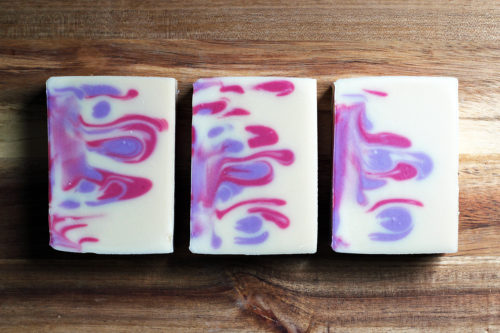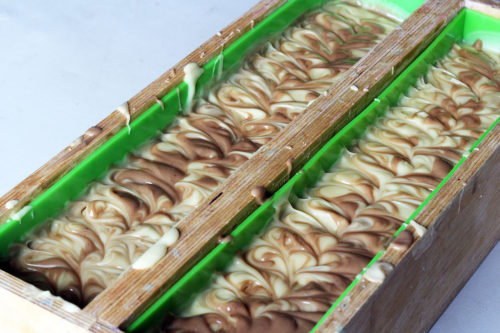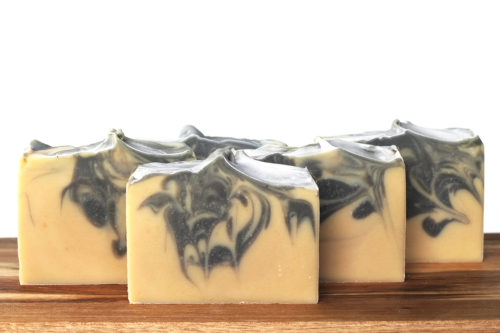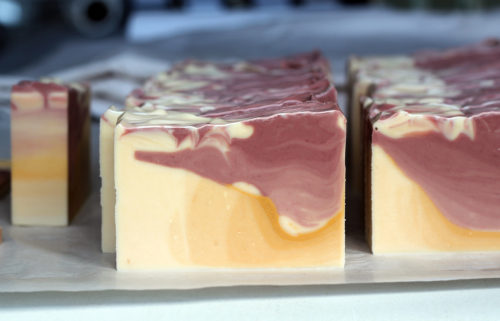
I run a soap making business. This means I spend a lot of time talking about, thinking about, and researching ingredients.
What they do, what properties they add to a soap, how they perform during saponification (the chemical reaction which turns oils into soap), how they’re going to blend seamlessly into the final product, or whether they’re going to stand out on purpose.
Then after all of this, I get to sell the ideas, the final products, to you, the consumer.
Most of what I do to make my business run, is marketing. Telling customers why they should buy my soap, why it’s good, why the ingredients I have chosen are the best ones for the purpose of the final product.
And I have to do all of this without making health claims I don’t have the money to back up with studies and TGA testing.
(Lots of larger companies skip this step – they can afford to pay the fines if the TGA finds out they’ve been making health claims, and selling the products fast is better marketing strategy than running effective studies to prove the claims they’re making. Smaller companies don’t have the luxury of this, and the TGA will have Serious Problems with us if we’re caught in contempt of their rules.)
I love ingredients. Love them to bits. I love how adding milk changes the chemical structure of my end result – not much, but enough I can tell. I love how different herbs and infusions change the smell, change the feel, change the lather in a bar of soap.
I love how honey and sugars add bubbles. I love the creaminess of a good beer soap, because beer is mostly sugars. I love how eggs contribute to strong stable lather and how it feels on your skin.
I love it all.

Marketing falls into two camps:
You Have A Problem And I Have A Product To Fix This
OR
You Want To Feel Good And Let Me Show You How I Can Help
Even though the first camp is the most common, there’s more money in the second camp – people will pay to feel good. It’s why scents often end up mattering more than ingredients, and why the soap lather feeling silky and amazing counts for more than the actual ingredients I chose to make it that way.
Shampoo companies know this, and it’s why brands like Herbal Essences sell better to a certain demographic than brands like Head and Shoulders. They both have a place on our shelves, but they’re very different products, and marketed very differently.
This said, it’s really REALLY hard to sell a soap online without talking about ingredients, because we don’t have the ability for customers to smell the actual soap.
I have an amazing soap right now – it’s Patchouli and Orange. It’s gorgeous. It smells divine (provided you like patchouli and orange essential oils). It’s also the creamiest soap, made with eggs from our hens, chamomile powder, activated charcoal, marshmallow powder, AND goat milk.
Awesome, right?
You’d think so, but the moment customers read about it having eggs in it, they carefully put it back down, looking a little grossed out, and move on. Or, they smell the soap, and without reading ingredients, decide they absolutely have to own a bar.

Now, part of my job means making sure the soaps feel as amazing as they look and smell – and this is why we have repeat customers. It doesn’t matter if a customer doesn’t know, or understand my ingredient choices, as long as I do.
They buy a soap at a market because they love the smell and want to feel good, and then the soap feels amazing, and so they come back to me and buy again.
But sometimes, getting people over the first ingredients hurdle – that sucks. They see “sodium hydroxide” (the necessary catalyst for making soap – all soapmaking uses it, whether it’s listed or not, and none remains in the final product anyway) and their nose crinkles, they put the bar down, and they walk away.
Ingredients can make or break a sale.
I love my ingredients. It’s really hard not to rave about why I chose tallow over olive oil in a particular soap (turns out, tallow is a much nicer oil for sensitive skin and eczema prone family members like mine), or why I used goat milk, buttermilk, coconut milk. They’re all slightly different, but they all have PURPOSE, and there is a reason for all of them.
Sure, sometimes the reason is “I wanted the soap to have a grey swirl, and activated charcoal is great for this, other benefits aside”, and other times it’s “I pureed a bunch of figs, because the sugars have AMAZING LATHER once the chemistry is done, and also tiny little fig seeds are excellent at exfoliating gently”.
Or there is dead sea mud (gently exfoliating, lovely and creamy, good for vegan soaps) and beer (amazing creamy lather, no beer scent in the final product I promise), or goat milk (has the best PR team out there, and also yes, it’s a gorgeous ingredient for lovely creamy bubbly soap).
We have a lovely salve. I infuse olive oil with herbs (lavender, chamomile, calendula) and when mixed with beeswax and cocoa butter, it makes an excellent skin saving barrier cream. We use it on everything here – scratches, cuts, dry skin. But I can’t make any claims about it during sales, because TGA laws. I can tell people how I use it. I can skirt around the edges of the law by talking about what the herbs are “thought to be” good for “historically”.
But I can’t tell you it will increase healing time, or help with infection, or work as a good substitute for bandaids when your smallest child has scraped their knee again, and there’s no blood but they keep crying anyway. (Okay I can tell you that last one)
I can just make a bloody good salve I love, hope people buy it, and tell their friends.
Small businesses, it turns out, have a lot more rules to follow than larger businesses who have the money to pay fines or fight battles in court.
Ingredients are a tricksy multilayered thing, and I spend a lot of time contemplating them.
I love each and every one of mine to bits. Even if I cannot always pronounce the INCI name of a bunch of them. (Butyrospermum Parkii (Shea Butter) anyone?)

Comments
3 responses to “A Discussion of Ingredients”
Well, I now want to buy a whole bunch! That was really interesting!
I had no idea eggs could be used in soap making. I knew about them years ago in egg-cream shampoos, which my hair loved and are no longer available. Anything out there now is a poor substitute for the Cheap Coles Savings brand Egg Cream shampoo which I bought by the litre.
Do the eggs make a creamier lather? I think I’d love anything with cocoa butter and cinnamon. Cloves too have a smell that I love.
This was absolutely fascinating. I don’t know why egg would immediately cause me to be turned off if you were discussing my skin, but interested if it was my hair…. what a weird gut reaction to have.
I found this whole article fascinating, I really did.